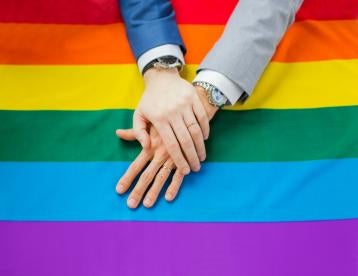In recent years, legal protections for the civil rights of LGBT individuals have expanded at a rapid pace. Since the U.S. Supreme Court struck down the federal Defense of Marriage Act (“DOMA”) in 2014 as unconstitutional, it has done the same with state-law equivalents. That same year, President Obama signed Executive Order 13672, which prohibits federal government contractors from discriminating on the basis of sexual orientation. The Equal Employment Opportunity Commission (“EEOC”) quickly jumped on the bandwagon with regard to other employers, affirming its position that Title VII protections extended to LGBT individuals. Now, the first U.S. Circuit Court of Appeals to consider the issue in this new legal landscape has disagreed – albeit reluctantly.
On July 28, 2016, the Seventh Circuit Court of Appeals (which covers Illinois, Indiana, and Wisconsin) issued its opinion in Hively v. Ivy Tech Community College, holding that Title VII does not apply to claims of sexual orientation discrimination. In that case, plaintiff Kimberly Hively was a part-time adjunct professor at Ivy Tech Community College, a large public community college in Indiana. She asserted that she was denied promotion to full-time status, and that Ivy Tech eventually decided not to renew her employment contract, because she was openly gay. The district court dismissed the claim, finding that Title VII does not apply to sexual orientation discrimination. Hively appealed.
In its analysis, the Court traced the legal history of Title VII, reiterating the prevailing judicial wisdom that Congress had a “narrow view of sex” when the Civil Rights Act was enacted in 1964, and that “sexual orientation and transsexualism, for example, did not fall within the purview of Title VII.” Indeed, Congress first proposed legislation to add sexual orientation to Title VII’s protected categories in 1974 and has done so every single year (except one) since 1994. The Court determined that, because “Congress has time and time again said ‘no,’ to every attempt to add sexual orientation” to the list of protected categories, it must necessarily not be included. Given Congress’ inaction and the U.S. Supreme Court’s silence, the Court decided it was bound by previous Seventh Circuit precedent denying extension of Title VII protections to LGBT individuals. The Court did recognize the EEOC’s recent position that Title VII was applicable to sexual orientation but quickly stated that “the rulings of the EEOC are not binding” on a federal court.
The Court did pause to ruminate on the fact that its decision “seems illogical” given that the U.S. Supreme Court has extended Title VII protections to claims of gender “stereotyping” or “nonconformity.” It opined that there seems to be “no rational reason” to entertain nonconformity and stereotyping claims under Title VII while not entertaining claims by individuals who are openly gay but otherwise conforming to gender norms and that, in the end, it “does not condone” this approach. Despite this conundrum, however, the Court concluded that “th[is] paradox is not [its] concern,” and that its task is to interpret Title VII as originally drafted by Congress, consistent with existing precedent, until the Supreme Court or Congress speaks on the issue.
In the end, the Seventh Circuit noted that, despite its Hively decision, “the writing is on the wall” with regard to LGBT civil rights. Similar lawsuits are currently pending in the Second and Eleventh Circuits. If one (or both) of those circuits disagrees with the Seventh, it would set up a circuit split that the U.S. Supreme Court could then resolve. Congress could also finally amend Title VII to include sexual orientation on the list of federally protected categories. Even in light of Congress’ inactivity, it should be noted that at least 22 states have stepped in to protect sexual orientation in their civil rights statutes – a list that will only expand. Employers should keep abreast of this rapidly-changing area of the law and consider adopting sexual orientation protections in their equal employment opportunity policies.




 i
i


